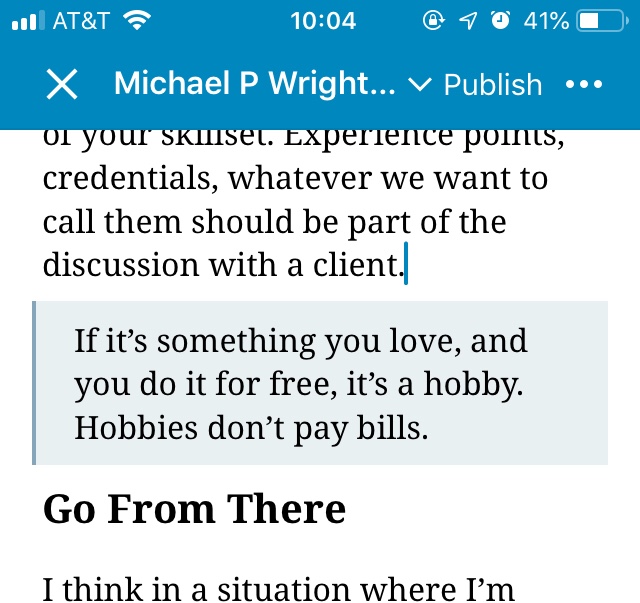This morning, I listened to an episode of Pat Flynn‘s podcast called AskPat 2.0: A Weekly Coaching Call on Online Business, Blogging, Marketing, and Lifestyle Design.
A travel blogger and mother of two has had success from her blog, but she has other interests and asks for advice on how to focus that energy without losing the momentum of the blog.
Something I noticed during the conversation is that when Pat mentions monetizing via affiliate marketing and sponsored posts, she was reluctant.
An Argument for Monetizing Your Skills
The whole thing forced me to wonder how would I convince someone to monetize or up their price for a hobby or skill with a following.
To persuade a person, I would start with the argument of valuing time. Let’s use for an example a blog.
Let Me Ask
My first question would force the person to put a dollar amount on their time. I don’t mean idle time. For your skill, how much would you charge an individual who askes you to prepare a 3000 word essay, a short video tutorial, a face-to-face interview of a professional in that field, etc.? What does that number look like? Per service? Per hour? Per product? Whatever.
Keep in mind that the value of something — or the cost in the case of a service — is what someone else is willing to pay for it. Whether they pay with time or money.
All Things Considered
In order to set your price(s), you have to be able to answer questions like how do my skills measure up to other skilled people who are available to this person. You have to know what’s unique about what you provide even if that’s just a faster turnaround or proximity to the client. In the case of blogging/writing, what part of your writing skills or service is most difficult to commoditize? (Which is the same question as ‘how your skills measure up to others’).
Another thing to consider before establishing your price tag is the time you have put in to hone these skills. There is a perceived value in “prep” or training time. Figuratively, those hours HAVE TO be a part of the equation. Also, it should be part of the presentation of your skillset. Experience points, credentials, whatever we want to call them should be part of the discussion with a client.
If it’s something you love, and you do it for free, it’s a hobby. Hobbies don’t pay bills.
Go From There
I think in a situation where I’m trying to convince someone that they should ask for adequate compensation for their skills, I would lead with the argument of valuing your time.
There are some tough questions that have to be answered. But when you can say $35 an hour or $10 per 1000 words, it’s clear to the others that you value this work.
If it’s something you love, and you do it for free, it’s a hobby. Hobbies don’t pay bills.
